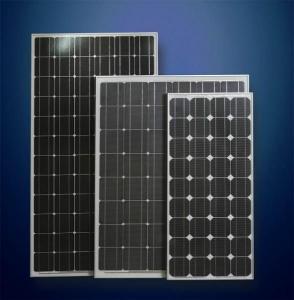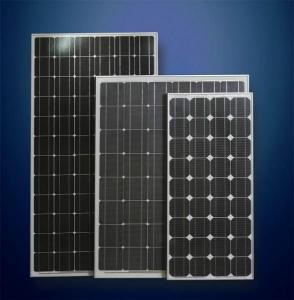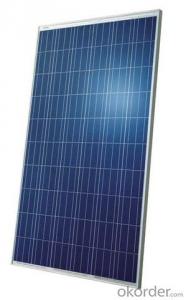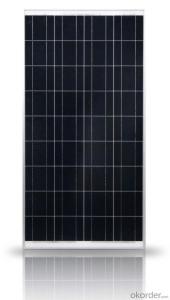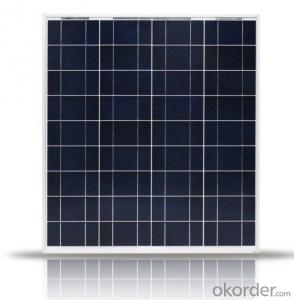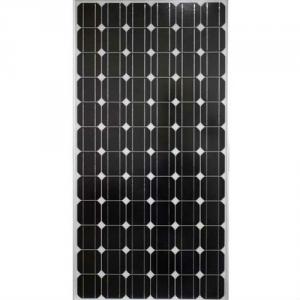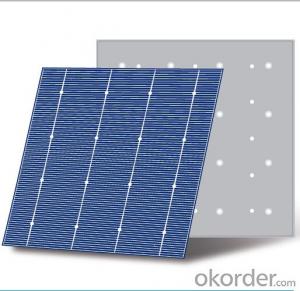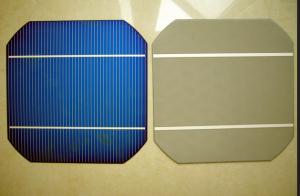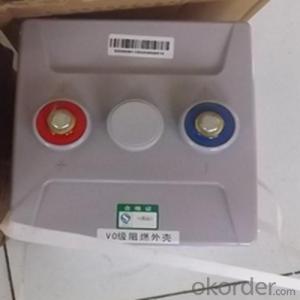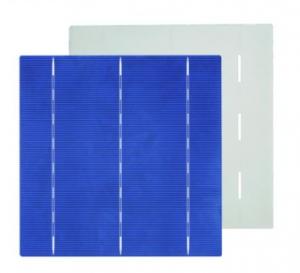Monocrystalline PV Module 190W-200W
- Loading Port:
- China Main Port
- Payment Terms:
- TT or LC
- Min Order Qty:
- -
- Supply Capability:
- -
OKorder Service Pledge
OKorder Financial Service
You Might Also Like
Structure
High Efficiency Monocrystalline PV Module190W-200W
Solar panel refers either to a photovoltaics (PV) module, a solar hot water panel, or to a set of solar photovoltaics modules electrically connected and mounted on a supporting structure. A PV module is a packaged, connected assembly of solar cells. Solar panels can be used as a component of a larger photovoltaic system to generate and supply electricity in commercial and residential applications.
Features
Nominal 20V DC for standard output.
Out standing low-light performance.
Heavy-duty anodized frames.
High transparent low-iron, tempered glass.
Rugged design to withstand high wind pressure, hail and snow load.
Aesthetic appearance.
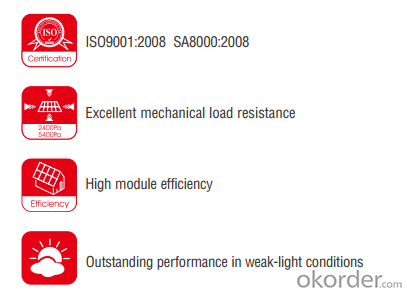
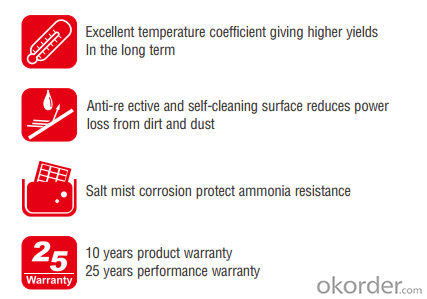

Images
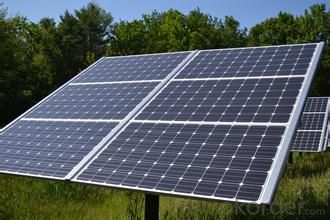
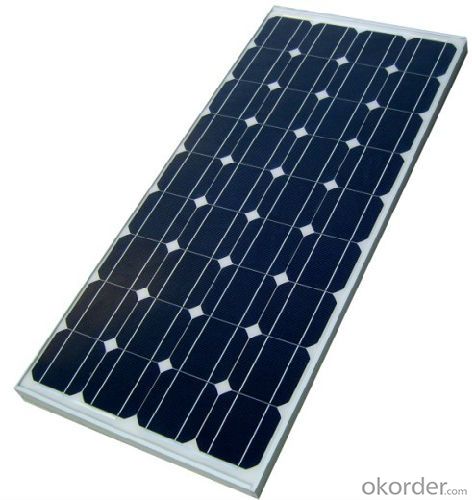
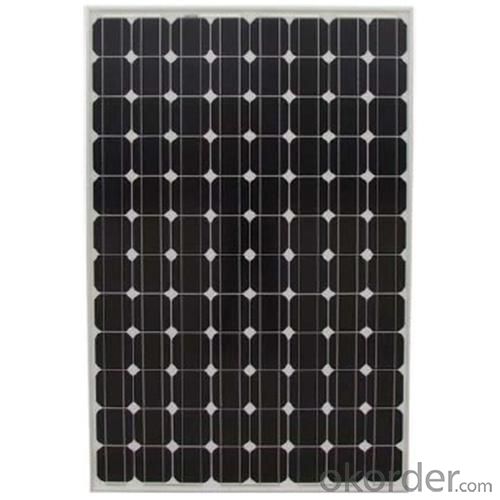
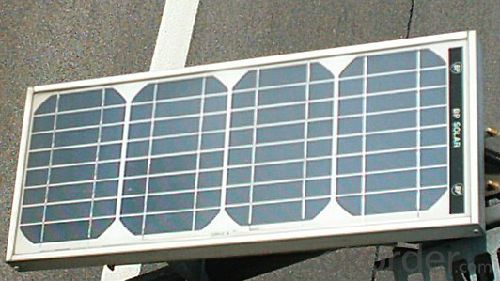
Specification
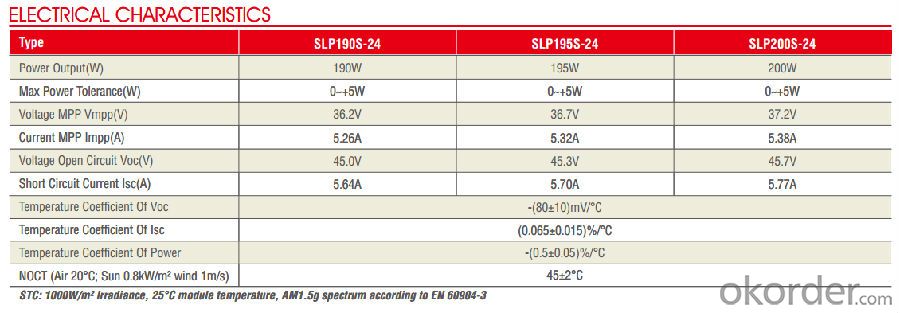

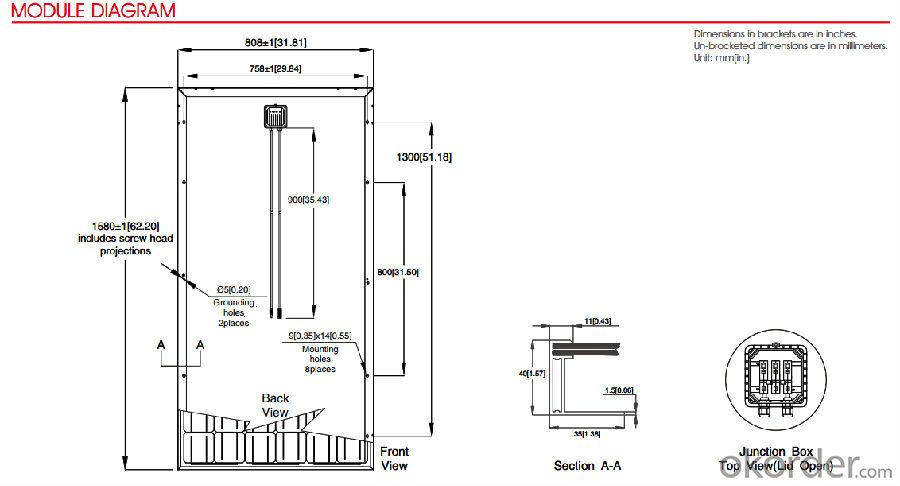
FAQ
Q:Can we visit your factory?
A:Sure,welcome at any time,seeing is believing.
Q:Which payment terms can you accept?
A:T/T,L/C,Moneygram,Paypal are available for us.
Q:Do you have the CE, TUV, UL Certification?
A:We’ve already passed all the tests, and any certificate is available.
Q:Have you ever sold your products to companies in my country?
A:Of course, we have customers in all general PV markets, but I think we should expand our market share along with the market growth.
- Q:What are the advantages and disadvantages of solar panels and diodes?
- If it is parallel in the positive and negative, then the protective effect, the diode is connected to the negative power supply, the diode negative connected to the positive power supply.
- Q:Can solar cells be used for powering shopping malls?
- Yes, solar cells can be used to power shopping malls. With their ability to convert sunlight into electricity, solar cells can provide a sustainable and renewable energy source for shopping malls, reducing their reliance on traditional power grids and lowering their carbon footprint. Additionally, the large rooftop spaces available in shopping malls make them ideal for installing solar panels, maximizing energy generation potential.
- Q:Can solar cells be used for powering electric vehicles charging stations?
- Yes, solar cells can be used to power electric vehicle charging stations. Solar panels can convert sunlight into electricity, which can then be used to charge electric vehicles. This helps to utilize renewable energy sources and reduce the carbon footprint associated with charging electric vehicles.
- Q:How do solar cells handle electromagnetic radiation?
- Solar cells are designed to handle electromagnetic radiation by converting it into usable electrical energy. The materials within the solar cells absorb photons from the sunlight, which in turn generates an electric current. This process effectively harnesses the energy from the electromagnetic radiation and allows solar cells to produce clean and renewable electricity.
- Q:Can solar cells be used for powering military bases?
- Yes, solar cells can definitely be used for powering military bases. Solar energy is a reliable and sustainable source of power that can provide electricity to meet the energy demands of military facilities. By utilizing solar cells, military bases can reduce their dependency on fossil fuels, enhance energy efficiency, and contribute to a cleaner and greener environment. Additionally, solar power systems can be installed in remote or off-grid locations, making it an ideal solution for powering military bases in various terrains and regions.
- Q:What is the role of bypass diodes in solar cell systems?
- The role of bypass diodes in solar cell systems is to prevent the damage caused by shading or partial shading of the solar panels. These diodes provide an alternate path for the current to flow when some portions of the solar panels are shaded, ensuring that the rest of the panels can still generate electricity efficiently. By diverting the current around the shaded area, bypass diodes help to maintain the overall performance and reliability of the solar cell system.
- Q:What is the environmental impact of solar cells?
- Solar cells have a relatively low environmental impact compared to other forms of energy generation. While their production does require the extraction and processing of raw materials, such as silicon and metals, the overall energy and resource requirements are relatively low. Furthermore, solar cells generate electricity without emitting greenhouse gases or other pollutants during operation, reducing air and water pollution. Although their end-of-life disposal can pose some environmental challenges, proper recycling and waste management can minimize these impacts. Overall, the environmental benefits of solar cells, including reduced carbon emissions and resource conservation, outweigh their limited environmental footprint.
- Q:How do solar cells perform in areas with high humidity and saltwater exposure?
- Solar cells can still perform well in areas with high humidity and saltwater exposure, although their efficiency may be slightly reduced. The moisture in the air and the saltwater can create a thin layer of corrosion on the surface of the solar cells, which can hinder their performance over time. However, advancements in solar cell technology, such as improved coatings and materials, have made them more resilient to these conditions. Regular cleaning and maintenance can also help mitigate the effects of humidity and saltwater exposure on solar cell performance.
- Q:Are there any library or exhibition halls where I can show students at school how the solar cells works?
- I chose to go to the library with my students, where they can learn a lot from the books.
- Q:Are solar cells affected by electromagnetic interference?
- Yes, solar cells can be affected by electromagnetic interference. Electromagnetic interference can degrade the performance of solar cells by disrupting the flow of electrons and causing fluctuations in output power. However, proper shielding and grounding techniques can be implemented to minimize these effects and ensure optimal functioning of solar cells.
1. Manufacturer Overview |
|
|---|---|
| Location | |
| Year Established | |
| Annual Output Value | |
| Main Markets | |
| Company Certifications | |
2. Manufacturer Certificates |
|
|---|---|
| a) Certification Name | |
| Range | |
| Reference | |
| Validity Period | |
3. Manufacturer Capability |
|
|---|---|
| a)Trade Capacity | |
| Nearest Port | |
| Export Percentage | |
| No.of Employees in Trade Department | |
| Language Spoken: | |
| b)Factory Information | |
| Factory Size: | |
| No. of Production Lines | |
| Contract Manufacturing | |
| Product Price Range | |
Send your message to us
Monocrystalline PV Module 190W-200W
- Loading Port:
- China Main Port
- Payment Terms:
- TT or LC
- Min Order Qty:
- -
- Supply Capability:
- -
OKorder Service Pledge
OKorder Financial Service
Similar products
New products
Hot products
Related keywords
